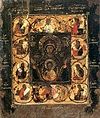

| Previous day | Next day |
| Old Style
March 8
|
Tuesday |
New Style
March 21
|
|
4th Week of Great Lent.
Tone 6.
Великий пост. |
Monastic rule: xerophagy (bread, uncooked fruits and vegetables).
|
![]() St. Theophylactus, bishop of Nicomedia (842-845).
St. Theophylactus, bishop of Nicomedia (842-845).
Apostle Hermas of the Seventy (1st c.). Hieromartyr Theodoretus, priest, of Antioch (361-363). Sts. Lazarus, founder (1391) and Athanasius, monk (15th c.), of Murmansk Monastery (Karelia). St. Andronicus (Lukash), schema-archimandrite of Tbilisi, Georgia, elder of Glinsk Monastery (1974).
“Kursk Root” Icon of the Sign of the Most Holy Theotokos (1898).
St. Felix of Burgundy, bishop of Dunwich and enlightener of East Anglia (ca. 648). Martyrs Quintilian and Capatolinus, at Nicomedia. St. Julian, archbishop of Toledo (690). St. Paul the Confessor, bishop of Plousias in Bithynia (ca. 840). St. Tarasius the Wonderworker, of Lycaonia.
Repose of Blessed Basiliscus of Uglich (1863) and Archbishop Vitaly (Maximenko) of Eastern America (1960).
Thoughts for Each Day of the Year
According to the Daily Church Readings from the Word of God
By St. Theophan the Recluse

Tuesday.
Baptism according to Apostle Peter is the answer of a good conscience toward God (I Pet. 3:21).[1] He who has been baptized gives a vow to live the rest of his time according to a pure conscience, according to the whole breadth of the Lord’s commandments, accepted in his conscience. Moral purity is a characteristic of one who is baptized. The Apostle Paul compares the brightness of this life with the brightness of the resurrected Lord. That like as Christ was raised up from the dead by the glory of the Father, even so we also should walk in newness of life (Rom. 6:4). In baptism, the old sin-loving man dies and a new man arises, zealous to do good works. Likewise reckon ye also yourselves, ye who are baptized, to be dead indeed unto sin but alive unto God through Jesus Christ our Lord. Let not sin therefore reign in your mortal body, that ye should obey it in the lusts thereof. Neither yield ye your members as instruments of unrighteousness unto sin: but yield yourselves unto God, as those that are alive from the dead, and your members as instruments of righteousness unto God. For sin shall not have dominion over you (Rom. 6:11–14).
[1]The Slavonic for I Pet. 3:21 reads: the promise of a good conscience toward God
Articles
 Venerable Athanasius of MuromSaint Athanasius was igumen at the monastery of Saint Lazarus during the mid-fifteenth century. |
 Icon of the Mother of God “Kursk-Root”The Kursk Root Icon of the Mother of God “Of the Sign” is one of the most ancient icons of the Russian Church. |






